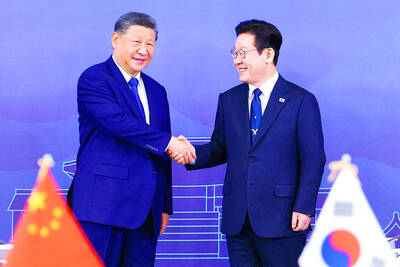Military-ruled Fiji remained defiant yesterday after its historic suspension from the 16-nation Pacific Islands Forum, rejecting the “punitive action” over a delayed election and warning it won’t be deterred from its chosen path even by “adversity.”
The coup-plagued nation was suspended from the regional bloc yesterday for what the forum called its rejection of democracy, freedom and human rights.
The suspension, the first in the forum’s 37-year history, bars Fiji’s leader, ministers and officials from taking part in any meetings or events and cuts Fiji out of development funding until a democratic government is restored.
Forum chairman Toke Talagi, premier of the micro-state of Niue, said Fiji’s rejection of fundamental principles like “the full observance of democratic values” and the promotion of human rights had given the forum no alternative.
But Fiji Attorney General Aiyaz Sayed Khaiyum said the military government “shall not be deterred from any of its objectives even in the face of adversity, created by some.”
“The [forum] statement ... falsely refers to so-called breaches of basic human rights, democracy and freedom under a military regime,” Sayed Khaiyum said in a statement. He did not elaborate.
He accused Australia and New Zealand of using their influence to force its suspension because of their “political agendas” and rejected the demand that Fiji hold elections within eight months.
“The untenable proposition that elections should be held at any cost immediately, even under a flawed system, is not only patronizing but demonstrates a lack of commitment to true democracy and sustainable parliamentary representation,” he said.
On Friday, Fiji’s military ruler, Commodore Frank Bainimarama, defied international pressure to announce elections, confirming they would not be held for five years.
That set the stage for his country’s ouster from the forum, which had given Fiji until Friday to announce elections for this year or be suspended from the group.
Bainimarama, who insists he has broad popular support at home, has consistently shrugged off international criticism and defended his decision to impose emergency rule and keep a lid on any challenges to his authority.
Bainimarama ousted the ethnic Fijian-dominated government in a 2006 coup and installed himself as prime minister. He has vowed to rewrite the constitution and electoral laws to remove what he says is discrimination against the country’s large ethnic Indian minority before holding elections. Critics say he shows little sign of being willing to give up power.

‘CHILD PORNOGRAPHY’: The doll on Shein’s Web site measure about 80cm in height, and it was holding a teddy bear in a photo published by a daily newspaper France’s anti-fraud unit on Saturday said it had reported Asian e-commerce giant Shein (希音) for selling what it described as “sex dolls with a childlike appearance.” The French Directorate General for Competition, Consumer Affairs and Fraud Control (DGCCRF) said in a statement that the “description and categorization” of the items on Shein’s Web site “make it difficult to doubt the child pornography nature of the content.” Shortly after the statement, Shein announced that the dolls in question had been withdrawn from its platform and that it had launched an internal inquiry. On its Web site, Le Parisien daily published a

China’s Shenzhou-20 crewed spacecraft has delayed its return mission to Earth after the vessel was possibly hit by tiny bits of space debris, the country’s human spaceflight agency said yesterday, an unusual situation that could disrupt the operation of the country’s space station Tiangong. An impact analysis and risk assessment are underway, the China Manned Space Agency (CMSA) said in a statement, without providing a new schedule for the return mission, which was originally set to land in northern China yesterday. The delay highlights the danger to space travel posed by increasing amounts of debris, such as discarded launch vehicles or vessel

RUBBER STAMP? The latest legislative session was the most productive in the number of bills passed, but critics attributed it to a lack of dissenting voices On their last day at work, Hong Kong’s lawmakers — the first batch chosen under Beijing’s mantra of “patriots administering Hong Kong” — posed for group pictures, celebrating a job well done after four years of opposition-free politics. However, despite their smiles, about one-third of the Legislative Council will not seek another term in next month’s election, with the self-described non-establishment figure Tik Chi-yuen (狄志遠) being among those bowing out. “It used to be that [the legislature] had the benefit of free expression... Now it is more uniform. There are multiple voices, but they are not diverse enough,” Tik said, comparing it

RELATIONS: Cultural spats, such as China’s claims over the origins of kimchi, have soured public opinion in South Korea against Beijing over the past few years Chinese President Xi Jinping (習近平) yesterday met South Korean counterpart Lee Jae-myung, after taking center stage at an Asian summit in the wake of US President Donald Trump’s departure. The talks on the sidelines of the APEC gathering came the final day of Xi’s first trip to South Korea in more than a decade, and a day after his meeting with the Canadian prime minister that was a reset of the nations’ damaged ties. Trump had flown to South Korea for the summit, but promptly jetted home on Thursday after sealing a trade war pause with Xi, with the two